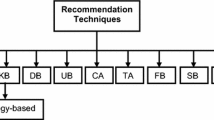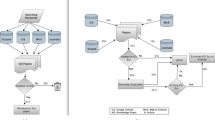Abstract
Some of the most remarkable innovative technologies from the Web 2.0 are the collaborative tagging systems. They allow the use of folksonomies as a useful structure for a number of tasks in the social web, such as navigation and knowledge organization. One of the main deficiencies comes from the tagging behaviour of different users which causes semantic heterogeneity in tagging. As a consequence a user cannot benefit from the adequate tagging of others. In order to solve the problem, an agent-based reconciliation knowledge system, based on Formal Concept Analysis, is applied to facilitate the semantic interoperability between personomies. This article describes experiments that focus on conceptual structures produced by the system when it is applied to a collaborative tagging service, Delicious. Results will show the prevalence of shared tags in the sharing of common resources in the reconciliation process.














Similar content being viewed by others
Notes
A pair of tags are related when both of them tag the same link by the same user.
The set of common tags that both of them use, independent of wether or not these tags have been used in different urls or not.
References
Alonso-Jiménez J-A, Aranda-Corral G-A, Borrego-Díaz J, Ferníndez-Lebrón M-M, Hidalgo-Doblado M-J (2008) Extending attribute exploration by means of boolean derivatives. In: Proc. 6th int. conf. on concept lattices and their applications, CLA-2008, Olomouc, Czech Republic. http://ceur-ws.org/Vol-433/paper10.pdf. Accessed 17 May 2012
Aranda-Corral G-A, Borrego-Díaz J (2010) Reconciling knowledge in social tagging web services (2010). In: Proc. 5th int. conf. hybrid AI systems, HAIS 2010. Springer, Berlin, Heidelberg, pp 383–390
Aranda-Corral G-A, Borrego-Díaz J, Giráldez-Cru J (2012) On the complexity of shared conceptualizations. In: Proc. 11th international conference on artificial intelligence and soft computing, ICAISC 2012. Springer, Berlin, Heidelberg, pp 629–638
Aranda-Corral G-A, Borrego-Díaz J, Giráldez-Cru J (2012) Conceptual-based reasoning in mobile web 2.0 by means of multiagent systems. In: Knowledge engineering notes, proc. 4th int. conf. agents and artificial intelligence ICAART 2012, pp 176–183
Bartolini I, Patella M, Romani C (2011) SHIATSU: tagging and retrieving videos without worries. Multimed Tools Appl pp 1–29. doi:10.1007/s11042-011-0948-1
Blondel V-D, Guillaume J-L, Lambiotte R, Lefebvre E (2008) Fast unfolding of communities in large networks. J Stat Mech Theory Exp 10:1–12. doi:10.1088/1742-5468/2008/10/P10008
Carmel D, Roitman H, Yom-Tov E (2010) Social bookmark weighting for search and recommendation. VLDB J 19(6):761–775
Eklund P-W, Wray T (2010) Social tagging for digital libraries using formal concept analysis. In: Proc. 7th int. conf. on concept lattices and their applications, CLA 2010, Seville, Spain, pp 139–150. http://ceur-ws.org/Vol-672/paper13.pdf. Accessed 17 May 2012
Gal A, Shvaiko P (2008) Advances in ontology matching. In: Advances in web semantics I. Springer, Berlin, Heidelberg, pp 176–198. doi:10.1007/978-3-540-89784-2_6
Ganter B, Wille R (1999) Formal concept analysis - mathematical foundations. Springer, Berling, Heidelberg
Gligorov R, Hildebrand M, van Ossenbruggen J, Schreiber G, Aroyo L (2011) On the role of user-generated metadata in audio visual collections. In: Proc. 6th international conference on knowledge capture, K-CAP ’11, Banff, Alberta, Canada, pp 145–152. doi:10.1145/1999676.1999702
Golder S, Huberman B-A (2006) The structure of collaborative tagging systems. J Inf Sci 32(2):98–208
Guigues J-L, Duquenne V (1986) Familles minimales d’ implications informatives resultant d’un tableau de donnees binaires. Math Sci Hum 95:5–18
Halpin H, Robu V, Shepherd H (2007) The complex dynamics of collaborative tagging. In: Proc. 16th int. conf. World Wide Web, WWW ’07, Banff, Alberta, Canada, pp 211–220. doi:10.1145/1242572.1242602
Haslhofer B, Sanderson R, Simon R, van de Sompel H (2012) Open annotations on multimedia Web resources. Multimed Tools Appl pp 1–21. doi:10.1007/s11042-012-1098-9
Jäschke R (2011) Formal concept analysis and tag recommendation in collaborative tagging systems. IOS Press, Heidelberg
Jäschke R, Hotho A, Schmitz C, Ganter B, Stumme G (2008) Discovering shared conceptualizations in folksonomies. J Web Semantics 6(1):38–53
Jung J-J (2009) Knowledge distribution via shared context between blog-based knowledge management systems: a case study of collaborative tagging. Expert Syst Appl 36(7):10627–10633
Jung J-J (2012) Discovering community of lingual practice for matching multilingual tags from folksonomies. Comput J 55(3):337–346
Kang Y-K, Hwang S-H, Yang K-M (2009) FCA-based conceptual knowledge discovery in Folksonomy, world academy of science. Eng Technol 53:842–846
Lee S, Park J (2011) Topic based photo set retrieval using user annotated tags. Multimed Tools Appl pp 1–20. doi:10.1007/s11042-011-0850-x
Man C, Yeung A, Gibbins N, Shadbolt N (2009) Contextualising tags in collaborative tagging systems. In: Proc. 20th ACM conference on hypertext and hypermedia, Torino, Italy. doi:10.1145/1557914.1557958
Onifade O-F-W, Thiéry O, Osofisan A-O, Duffing G (2010) Fuzzontology: resolving information mining ambiguity in economic intelligent process. Commun Comput Inf Sci 54:232–243
Pammer V, Kump B, Lindstaedt S (2011) Tag-based algorithms can predict human ratings of which objects a picture shows. Multimed Tools Appl 59(2):441–462. doi:10.1007/s11042-011-0761-x
Smith G (2007) Tagging: people-powered metadata for the social web. First New Riders Publishing, Berkeley, CA
Weick K-E, Sutcliffe K-M, Obstfeld, D (2005) Organizing and the process of sensemaking. Organ Sci 16(4):409–421
Acknowledgements
This work has been supported by TIN2009-09492 and TIN2010-20967-C04-01 projects of Spanish Ministry of Science and Innovation and Excellence project TIC-6064 of Junta de Andalucía cofinanced with FEDER founds.
The authors would like to thank the anonymous reviewers for their valuable comments and suggestions to improve the quality of the paper.
Author information
Authors and Affiliations
Corresponding author
Rights and permissions
About this article
Cite this article
Aranda-Corral, G.A., Borrego-Díaz, J. & Giráldez-Cru, J. Agent-mediated shared conceptualizations in tagging services. Multimed Tools Appl 65, 5–28 (2013). https://doi.org/10.1007/s11042-012-1146-5
Published:
Issue Date:
DOI: https://doi.org/10.1007/s11042-012-1146-5




